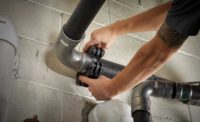
Butch Welsch
Two weeks following the signing of the American Recovery and Reinvestment Act, President Barack Obama and the U.S. Department of Treasury released guidelines and $75 billion for the “Making Home Affordable” program in an effort to slow down the rate of foreclosures in the United States; the ADP National Employment Report® determined that another 697,000 nonfarm private employees had lost their jobs from Jan. to Feb. 2009; and according to an online study of independent Registered Investment Advisors (RIAs) done by Koski Research, San Francisco, for Charles Schwab, San Francisco, 44 percent of RIAs expected the recession to last through the end of 2009 and 41 percent felt it would last into 2010.
With 85 percent of RIAs estimating at least another year of economic uncertainties, HVACR contractors continue to address the business challenges that have ebbed and flowed in the industry for years.
INTERNAL BUSINESS MATTERS
Residential and commercial contractors alike addressed common budgetary issues such as gas prices and the multiple insurances necessary to run a successful and safe business. Knowing that fluctuating gas prices will continue despite the current lull, investments have been made in GPS systems and higher-fuel efficiency vehicles from natural gas to diesel Sprinters to hybrid vehicles. The overall emphasis this past year was on improved gas mileage with consideration to the bottom line.“Instead of everyone driving 3/4-ton vans, some employees now drive 1/2-ton vehicles,” said Jason Putnam, vice president of operations and business development, Pro-Air Services Inc., Decatur, Ala. “We have also purchased several Chevrolet HHRs that get over 30 mpg in place of the higher fuel consuming trucks that our managers and estimators drove.”
Beyond fuel, auto insurance brought cost considerations to the contractor table as well, but it is health insurance that really makes headlines, especially for small businesses. Contractors engaged their yearly shop and save comparison rituals but many, like George “Butch” Welsch, president of Welsch Heating & Cooling Co., St. Louis, found nothing more than discounted higher costs.
“With the soft market right now, we are anticipating a possible decrease in business insurance premiums,” he encouraged. “Rising costs in medical insurance, however, will undoubtedly require us to change the benefit structure, e.g., higher deductibles and co-pays.”

Brian Leech
SURVIVOR vs. CONQUERER
To compensate for the increased cost of doing business, contractors are guarding the bottom line with even more vigilance than before. It has been observed that in this economy they are taking one of two distinct approaches - survivor or conqueror.Both types of contractors experienced failing residential housing markets and a decline in the commercial sector in 2008 and neither expect to see great improvement in 2009.
The survivor’s response has been to tighten his or her belt and get back to business basics with superior customer service. The conqueror, like Brian Leech, general manager/owner of Service Legends in Des Moines, Iowa, and a member ofThe NEWS’Contractor Panel, is looking to grow and expand his business. Leech’s company reported profits were up 17 percent in 2008 over 2007 levels.
“We have increased our marketing and we are marketing in new areas, resulting in increasing response rates and reducing costs per lead,” he said. “There are new players in the market with the slowdown in the housing market, and part of our plan is to assist struggling companies through strategic acquisition.”
With his plan in place, Leech is projecting a 27 percent increase in his numbers.

Larry Taylor
FIERCE COMPETITION
The commercial side of the HVACR industry continues to feel the effects of the residential housing slump even though, overall, they are faring better than their residential counterparts. According to Barbara Dolim, executive director of the Mechanical Service Contractors of America (MSCA), “As residential contractors continue to lose business, they are encroaching on the commercial market. Prices are being driven down and many weak companies are going out of business.”This trend is crowding the commercial market and creating fierce competition. Jim Herndon, president of Controlled Conditions Corp., Chesapeake, Va., is concerned that residential contractors have begun pursuing commercial work and are, “often lowballing to get it.”
Larry Taylor, president of AirRite Air Conditioning, Fort Worth, Texas, and a member ofThe NEWS’Contractor Panel, was concerned as well. “We have seen a large influx of contractors from the residential new construction market into the retro market, which is depressing pricing and lowering quality a lot,” he said.
Paul Sammataro, president of Samm’s Heating and Air Conditioning, Plano, Texas, brought to light another quality situation arising from the sharp downturn in the residential market. This residential contractor cautioned the industry about “lowballers who will be pricing low out of desperation for work.
“We cannot control the bottom of the barrel workers that companies release due to slower times,” he said. “But, we always try to follow up with our customers once a job is proposed, and if they contract with another company or are ready to, I try to find out where we lost the job. Usually it is because of the overall cost.”
“Bottom line,” summed up Welsch, “there are too many contractors chasing too little work.”

Ken Bodwell
STIMULUS SOLUTIONS?
As for the stimulus package, it remains to be seen how many positive outcomes the HVACR industry and its multiple players will experience. For contractors, consumer education will be integral. In order to take advantage of the tax credits made available by the American Recovery and Reinvestment Act, consumers must know and understand the types of equipment that are eligible for the tax credits. They will also most likely need financing in order to cover the initial investments. Over the past few years, however, creditors have continued to tighten lending standards making it more difficult for consumer financing approval.Some contractors have responded by extending their own form of financing or offering extended billing. Others are increasing the types of financing they offer and continue to search for the best offers available for their customers in order to ensure that financing issues do not get in the way of a sale.
Regardless of the positive and encouraging messages coming from Washington, not all contractors are convinced that this stimulus package will be the silver bullet for the HVACR industry. Steven Long, president of the Service and Residential HVAC division for Gastonia Sheet Metal Heating, Air Conditioning & Roofing, Gastonia, N.C., doubts that the stimulus package and tax credits alone will be enough, despite its promises, to fuel a significant amount of business.
“In the long run, I think it will be detrimental to business in general,” he cautioned as he predicted that his 2009 numbers would still drop 15-20 percent. “I am concerned that these tax credits will not be enough to overcome a less business-friendly administration and low consumer confidence.”

Ann Kahn
FOGGY FUTURE
The residential and commercial HVACR contractors’ future is unclear.“With a new administration that is unproven; an economy that is in the tank; and a general attitude of doom being peddled by the media, my crystal ball is foggy,” said Ken Bodwell, director of marketing for Innovative Service Solutions in Orlando, Fla., and a member ofThe NEWS’Contractor Panel.
Bodwell, along with multiple other contractors, however, did say that there were certain trends to watch for as 2009 develops.
“Depending on how long this recession lasts, I think the independent contractor is going to see a resurrection of the manufacturers consolidating small contractors under their umbrella,” he said.
“Stiff pricing competition, lack of properly trained and qualified technical workers, continuing restrictive legislation, and higher taxes are a few of the issues I expect to see all businesses face in the near future,” said Ann Kahn, president of Kahn Mechanical Contractors in Dallas, and a member ofThe NEWS’Contractor Panel. “Many things are beyond the contractor’s control and that will always be. We have to put aside what we cannot control and focus our energies on areas that we can control.”
According to Paul Wadsworth, president of PK Wadsworth Heating and Cooling, Cleveland, one of the keys to successful navigation in the coming year will be to “make mid-course corrections as we go.”
Other keys will be to keep an eye on the economy, the rebuilding of the workforce once the economy turns around, insurance cost escalation, field labor shortages, and the disappearance of competitors. All of these things will continue to evolve in 2009, changing the contractor’s overall landscape in the HVACR industry.
Publication date:03/23/2009





